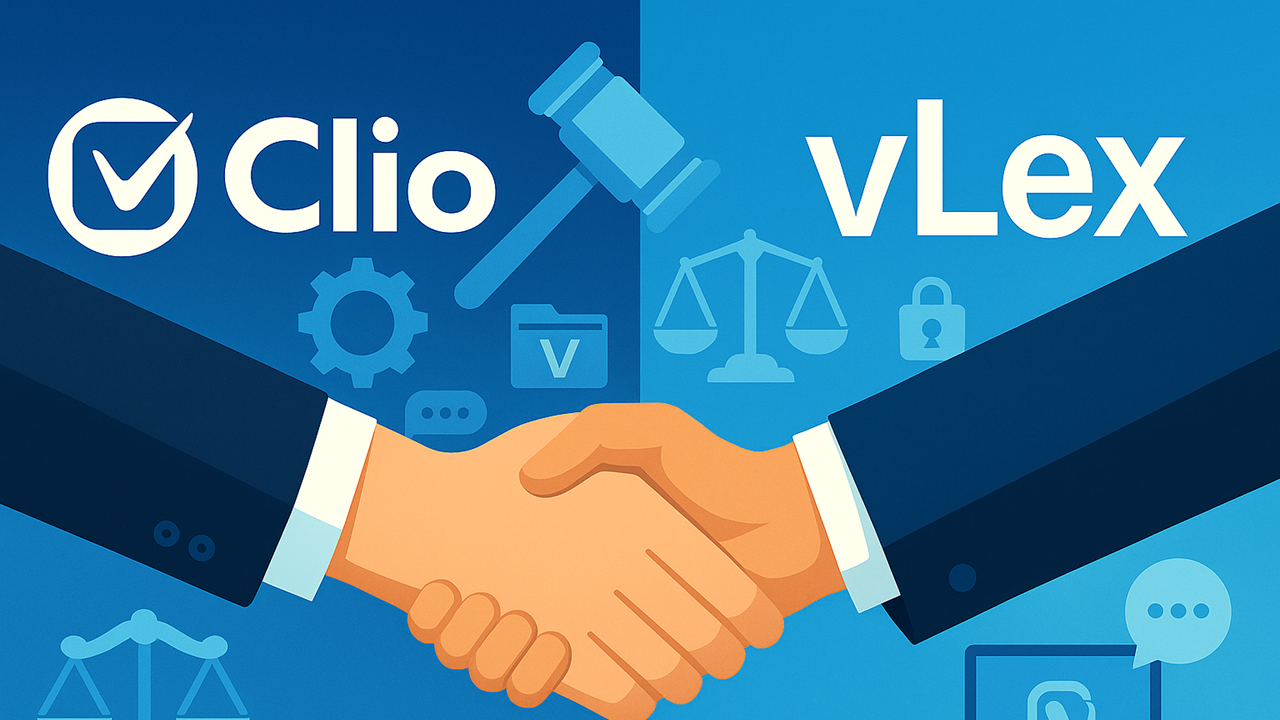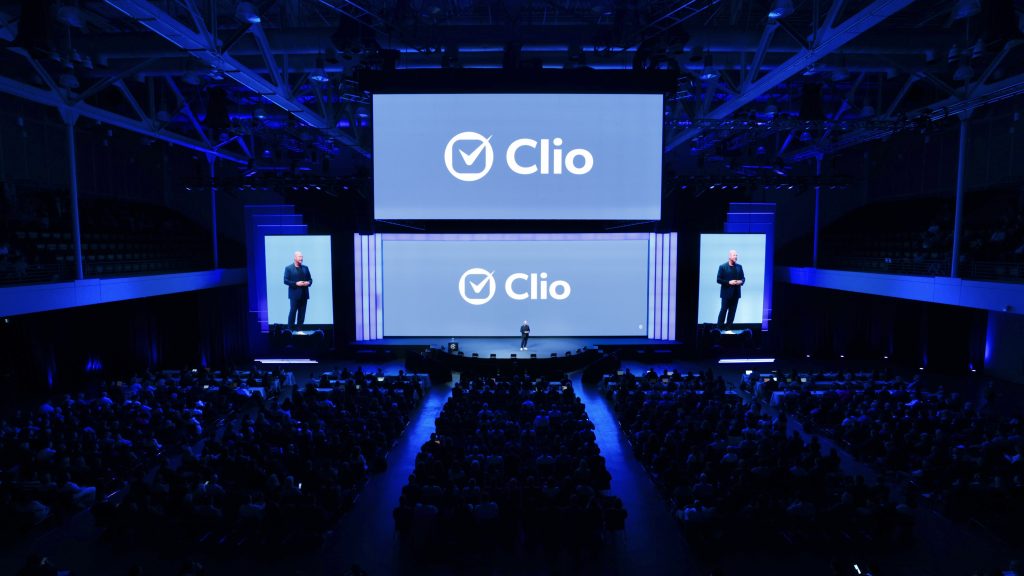Legal technology company Clio has completed its $1 billion acquisition of vLex, marking the conclusion of the largest deal in legal tech history, and has simultaneously closed a $500 million Series G funding round, along with a $350 million debt facility, valuing the combined company at $5 billion, and clearing the way to move forward on creating an unprecedented unified platform that spans both the business and practice of law.
With the deal now closed, Clio becomes a company with $400 million in annual recurring revenue and a customer base of 400,000 legal professionals, it says.
Today’s dual announcements cap an extraordinarily compressed 180-day period during which Clio executed the largest acquisition in legal tech history while securing substantial new financing – all while building and launching major new products that debuted at its ClioCon conference in October.
“This is a defining moment for Clio and for the legal industry,” said Jack Newton, Clio’s founder and CEO. “We founded Clio to transform the legal experience for all, and this milestone brings that mission to a new horizon.”
The transaction brings vLex’s 350-plus employees – including experts in law, data and technology – into Clio’s organization, creating what Newton calls “the world’s most powerful legal intelligence platform, a platform that will define how legal work is done for generations to come.”
The acquisition, which was originally announced on June 30, 2025, received final regulatory approval from Spanish authorities in late October, clearing the way for it to close.
The finalization of this mega-deal brings together Clio’s cloud-based legal operating system, reportedly used by more than 200,000 legal professionals globally, with vLex’s comprehensive legal research platform and its Vincent AI assistant, which serves 2.8 million registered users across more than 110 countries.
(Clio said that number of 2.8 million users reflects the entirety of vLex’s partnerships, including academic and nonprofit partnerships, some of which Clio does not count as part of its combined customer count of 400,000.)
A Whirlwind 180 Days
In an exclusive LawSites interview Thursday with Newton and Chief Financial Officer Curt Sigfstead, before the two flew off to vLex headquarters in Barcelona to celebrate the closing, Newton told me that he first met with vLex CEO Lluís Faus exactly 180 days before the deal officially closed last week – a remarkably compressed timeline for executing not only a $1 billion acquisition, but also the Series G financing and an accompanying $350 million debt facility.
“I’ve never been so proud of what the team’s been able to execute on in a compressed time frame at Clio,” Newton told LawSites. “And on top of that, we built a really phenomenal and impactful new product in the form of Clio Work and launched that and had that in customers’ hands the week after ClioCon.”
Newton’s ClioCon keynote, in which he unveiled the company’s vision for an “Intelligent Legal Work Platform,” generated extraordinary reaction across the legal industry. The keynote has garnered more than 20,000 views on YouTube, and Newton said the response extended far beyond Clio’s existing customer base.
“It felt like it was the shot heard around the world and people really understand a clear vision of how AI was going to transform the practice of law,” Newton told me. “This idea of marrying the business of law and practice of law, in the specific way we’ve done with this new intelligent legal work platform, obviously struck a chord.”
Integration Already Underway
Even before closing the deal, Clio had moved quickly to leverage the capabilities vLex brought to the table. At its ClioCon conference in Boston in October, held before the regulatory approval was finalized but with the deal’s closure anticipated, Newton unveiled an ambitious suite of new products built around the vLex acquisition.
Related: Here’s A Guide To Help You Make Sense of Clio’s New Line Up of Products and Features.
These included Clio Work, a new workspace that combines matter data with vLex’s legal library to deliver AI-powered research and case strategy; Clio for Enterprise, a new division targeting large law firms and corporate legal departments; and Vincent Studio, a no-code environment allowing lawyers to build custom AI tools.
The company also launched Vincent by Clio, positioning the AI platform as the engine for “enterprise-grade legal AI” grounded in verified legal data. According to Clio, vLex was already deployed at eight of the world’s 10 largest law firms prior to the acquisition.
Financing to Power Growth
The Series G funding round was led by New Enterprise Associates (NEA), with participation from TCV, Goldman Sachs Asset Management, Sixth Street Growth, and JMI Equity. NEA had also led, and all of these investors had also participated in, Clio’s record-setting $900 million Series F round last year.
The round also includes a strategic $350 million debt facility led by Blackstone and Blue Owl Capital.
“Clio continues to demonstrate the clarity, execution, and ambition that define enduring market leaders,” said Tony Florence, co-CEO at NEA. “The company has built one of the most trusted platforms in legal technology, and its integration of AI is reshaping how work is done across the profession.”
In our interview Thursday, CFO Sigfstead emphasized that the insider round, in which existing investors wrote substantial new checks, signaled extraordinary confidence in the company’s direction.
“When you turn to your existing investors and they step up in the way that they did, the confidence that we have going into the transaction is just that much greater,” Sigfstead said.
“Anytime you see this kind of an insider round – especially with the kind of dollars we’re talking about here, where some investors are writing multi hundred million dollar checks on their own – it’s the strongest endorsement you can have of a company and I’m very appreciative of the investors we have,” Newton added.
The financing serves multiple purposes: helping to fund the vLex acquisition while positioning Clio for future strategic acquisitions and aggressive investment in AI development and enterprise expansion, Sigfstead said.
“We didn’t need to use all the cash and all the debt to finance the vLex deal,” Newton said. “We’ve got a substantial amount of both cash flow in the balance sheet as well as available debt facility to give us headroom for future M&A as well as headroom for an aggressive invest in AI and the enterprise expansion opportunity.”
“The addition of debt partners like Blackstone and Blue Owl Capital reflects the strength and resilience of our business,” Sigfstead said in the company’s announcement. “This financing supports transformational moves like the acquisition of vLex and gives us the flexibility to act quickly on future opportunities that advance our mission and shape the future of legal technology.”
Oakley Capital Takes Equity
In another significant aspect of the deal signaling confidence in Clio’s future, Oakley Capital, the European private equity firm that owned a majority stake in vLex, chose to take a substantial portion of the transaction consideration as Clio equity rather than cash.
“Oakley choosing to roll such a significant portion of its deal value into Clio is another great signal of support and excitement around the thesis of what we’re building with Clio and vLex together,” Newton said.
Newton said his team had been very explicit in pitching Oakley on the vision for how combining the two companies would create a new category of software that would be both disruptive and transformative.
“They wanted to be part of that,” he told me. “They were really excited about the one plus one equals 10 math that we feel like we’re creating by bringing these two companies together.”
Arthur Mornington, a partner at Oakley Capital, will join Clio’s board as a board observer.
‘Intelligent Legal Work Platform’
The completed acquisition unites Clio’s legal operating system with vLex’s Vincent AI, powered by one of the world’s most comprehensive global legal databases containing more than one billion editorially enriched documents across 110 jurisdictions.
This “Intelligent Legal Work Platform,” as Clio is calling it, represents what Newton describes as a shift from a traditional “system of record” to a “system of action” that leverages dynamic intelligence.
By combining practice management, research, drafting, and firm operations into connected AI-powered workflows, the platform aims to enable legal professionals to move from insight to action with greater speed and precision.
Vincent AI provides what Clio characterizes as “the strongest foundation for legal reasoning,” drawing from vLex’s massive library. Combined with Clio’s AI capabilities across Clio Work, Clio Manage, Clio Grow and Clio Draft, the platform promises unparalleled accuracy, efficiency and confidence, Clio says.
In our interview last week, Newton emphasized that data quality is the crucial differentiator – not just against legal AI startups, but against the “omnipresent threat of OpenAI as a competitor.”
“At the end of the day, data is really the only competitive moat that I believe is sustainable,” Newton told LawSites. “If you don’t have a differentiated approach on data, I think you’re on a path to very rapid commoditization.”
Integration of Leadership Teams
Virtually every key member of vLex’s leadership team is joining Clio in significant roles, marking a deep integration of the two organizations. These include Lluís Faus, vLex’s co-founder and CEO, his brother Angel Faus, vLex’s co-founder and CTO, and former Fastcase founders Ed Walters and Phil Rosenthal, who joined vLex after the 2023 merger of the two companies.
Related: On LawNext Podcast: The Four Founders of vLex and Fastcase on the Merger Of Their Two Companies.
Newton told me that he will be in Barcelona today to celebrate the deal’s closing with the vLex leadership team and other senior leaders from both companies.

The founders of Fastcase and vLex, which merged in 2023, laying the groundwork for the Clio acquisition.
“One of the main goals of this transaction and bringing vLex on board isn’t just integrating the practice of law and the business of law from a product perspective,” Newton said, “it’s integrating the business of law and the practice of law from an organizational perspective as well.”
Newton said that vLex’s entire workforce is joining Clio and that he does not anticipate significant redundancies or layoffs, characterizing the acquisition as bringing “a net new set of capabilities and a unique set of team members pursuing a highly complementary and non-overlapping mandate.”
“This deal is all oriented around growth and upside opportunity as opposed to any kinds of cost savings or synergies on the cost front,” he said.
Accelerating Enterprise Expansion
The vLex integration accelerates Clio’s expansion into the enterprise market, extending its reach from small- and mid-sized firms to the world’s largest legal organizations. According to Clio, vLex was already deployed at eight of the world’s 10 largest law firms before the acquisition.
This follows Clio’s March 2025 acquisition of ShareDo, a U.K. company that provides enterprise case and matter management software for large firms. ShareDo has been rebranded as Clio Operate, a work management platform for large firms and corporate legal departments that unifies workflows, analytics and matter management across global teams.
Together, vLex and Clio Operate anchor Clio for Enterprise, a new division dedicated to serving the complex needs of global legal teams.
“Really we’re serving now solo practitioners all the way to the world’s largest law firms,” Sigfstead told me. “The ceiling here – the market opportunity in terms of what Clio is able to deliver – has expanded dramatically. And that’s a very different message from a year ago.”
Creating A Category
Beyond the financial and operational details, Newton emphasized that the deal represents what he calls “category creation” – defining a new type of legal technology platform that fundamentally changes how law firms operate.
“I think what we’re seeing is a really exciting shift from software being adopted in a way that it tries to conform to the existing ways that lawyers work, to this intelligent legal work platform being deployed and fundamentally altering how law firms operate and even the way they staff,” Newton said.
He noted that customers and prospects are now “thinking about not just adopting a piece of software, but changing the way their entire practice operates around this concept of an intelligent legal work platform.”
When asked about skeptics who question whether Clio can truly serve all segments of the legal market, from solo practitioners to Am Law 100 firms, Newton had a simple response: “Watch us.”
Historic M&A Deal
The combined transaction represents the largest M&A deal in legal technology history. The only other comparable deal was Reveal’s dual acquisition of Logikcull and IPRO for a reported $1 billion in 2023.
For vLex, the deal also makes it one of the few Spanish technology companies to achieve unicorn status, joining a growing roster of Barcelona billion-dollar startups that includes Glovo, TravelPerk, Wallbox, and Factorial.
For Clio, based in Burnaby, British Columbia, the acquisition represents the largest technology deal by a privately held Canadian company, cementing its position as one of Canada’s most valuable tech startups.
The completion of the deal comes 16 months after Clio raised what was then a record-setting $900 million Series F round in July 2024, which valued the company at $3 billion. That round provided the capital that made the vLex acquisition possible.
In this latest deal, Goldman Sachs acted as Clio’s exclusive financial advisor. Law firms Osler, Hoskin & Harcourt LLP, Wilson Sonsini Goodrich & Rosati, Gowling WLG, and Pérez-Llorca served as legal counsel to Clio.
J.P. Morgan acted as vLex’s exclusive financial advisor. Law firms A&O Shearman and Uría Menéndez served as legal advisors to vLex.
Looking Ahead
With the deal now closed and substantial new capital on hand, Clio is positioned to accelerate its AI innovation and pursue additional strategic acquisitions. The company has made clear that it views itself as what Newton previously called “the acquirer of choice in legaltech,” capitalizing on what he described as an “explosion of innovation” across the sector.
The company’s trajectory from its founding in 2008 as a cloud-based practice management platform for small firms to its current position as a $5 billion company serving the entire legal market represents one of the most remarkable growth stories in legal technology.
In our interview, as Newton reflected on the ClioCon keynote response and the completion of this landmark deal, he returned to his theme of category creation and industry transformation.
“I think we’ll see just what a profound impact that will have on the legal industry in the coming months and years to come,” he said.
 Robert Ambrogi Blog
Robert Ambrogi Blog
